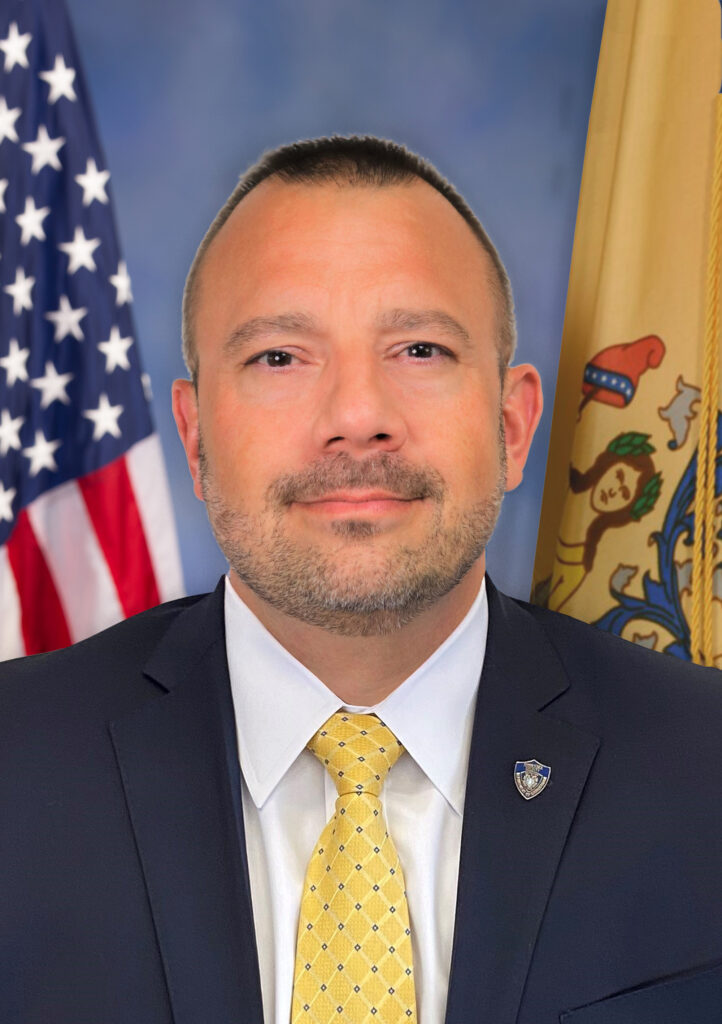By Lizz Dinnigan
In an effort to expand and improve our presence, reach and efficacy among LGBTQIA+ youth, Wellspring Center for Prevention will be partnering with the New Jersey LGBTQ Law Enforcement Liaison effort for our LGBTQIA+ Advisory Committee. The committee’s formation was a result of Wellspring being the sub-recipient of a grant from Prevention Resources through funding they receive from the New Jersey Division of Mental Health and Addiction Services.
David D’Amico, Chief Investigator for the Middlesex County Department of Corrections (MCC) and co-chair of the New Jersey LGBTQ Law Enforcement Liaison effort, is working to rebuild trust and communication between law enforcement and the LGBTQIA+ community throughout New Jersey.

The Origins of New Jersey’s LGBTQ Law Enforcement Liaison Program
The liaison program was conceived in 2016 by four people: D’Amico, plus the first openly gay male New Jersey state trooper, and liaisons from Newark and Jersey City. All liaisons are appointed by the chiefs at their particular agency. The team is working to sell the program concept with help from the Attorney General, Police Benevolent Association, New Jersey County Jail Wardens Association, and leaders in law enforcement. According to D’Amico, short-term goals are to grow the liaison team exponentially. “Since 2016, we have grown from four to 148 liaisons representing 80 departments statewide. Our goal is to have at least every county represented (21) and then every department.”
Law enforcement leaders across the country have learned that law enforcement must reflect the community in which we serve, D’Amico explains. “We are recruiters and retainers of qualified LGBTQIA+ candidates,” he says. “We go to community events and try to recruit people to join our ranks to help us solve the problem. The perceived thought process among this marginalized community is that law enforcement doesn’t take them seriously. We want to debunk that with positive interactions and calling ourselves out on the bad ones.”
Rebuilding Trust Between Law Enforcement and the LGBTQIA+ Community
D’Amico, who has spent 36 years of his career in law enforcement, emphasizes the importance of reestablishing trust. “In any relationship with humans, there’s no relationship if there’s no trust,” he says. “Our mission is to rebuild trust and community engagement by being visible, showing up, answering tough questions and being responsible. There are a lot of stressors with law enforcement heightened by fear because the community doesn’t believe they will be understood by a male-dominated, paramilitary police force.”
The trust barrier/issue between law enforcement and the LGBTQIA+ community stems back to the 1969 Stonewall Uprising in New York City, a series of events that took place over six days between police and LGBTQIA+ protestors, when the police raided the popular gay bar Stonewall Inn (homosexuality was considered a criminal offense), and patrons fought back.
It was time to take accountability. “In 2016, I moved back to New Jersey from Florida, where I was a deputy sheriff, because I had been recruited by the MCC to be their chief investigator,” says D’Amico. “Garden State Equality [the largest LGBTQIA+ education and advocacy organization in the state] called and said, ‘We have a problem: the LGBTQIA+ community doesn’t trust the police; what can we do?’ We put our heads together.”
History and misconduct dates back to the Stonewall Uprising and previous mistreatment of the LGBTQ community by law enforcement due to the excessive use of force, as well as enforcement of existing laws on the books at the time, D’Amico explains. “The school of thought back then was that you must have a mental illness if you’re gay. It evolved from there [same-sex relationships were legalized in 1980], but the trust has not evolved. We needed to take responsibility—law enforcement has a role to play. They have to keep the community safe, especially the minority and vulnerable communities.”
The liaison team is very active during June (Pride Month) and October (National Coming Out Month). They have been getting more phone calls from their straight counterparts. D’Amico says a state trooper called and asked, “My son identifies as gay, and I don’t know what to do. How do I still let him know I love him? I want to build communication with my son.”
Training and Success Stories From the Liaison Program
There are other ways in which the liaison team has stimulated growth and conversation. “John Hayes, police director in Asbury Park, adopted a LGBTQIA+ training component. He reached out to the New York Police Department because they were doing a LGBTQIA+ cultural competency training for recruits. Hayes bought the “Policing and the LGBTQ+ Community” training, adapted it to New Jersey laws, and now New Jersey officers are trained. The training is an elective, although if the academy offers the training, the recruits are required to attend.
A success story that stemmed from this training is that a recruit, a straight white male who recently graduated from the academy, responded to a call for service on his own for a suicidal youth holding a knife to her neck. He immediately recognized the individual was trans and introduced himself using pronouns. The youth took the knife down and acknowledged she was safe. The situation de-escalated, and the recruit saved a life.
Supporting LGBTQIA+ Youth at Critical Moments
“In 2025, when we think about everything that is going on in the world, the number-one concern for the LGBTQIA+ community is suicide,” says D’Amico. “If a young person identifies as LGBTQIA+, they are more likely to be excluded from their families or kicked out of their home. There are many risk factors, as members of the LGBTQIA+ community often find themselves involved with gangs, sex work, illegal drugs, alcohol, and human trafficking. They are trying to survive and are more susceptible, which is when they are likely to come into contact with law enforcement.”
Challenges and Long-Term Goals of the Liaison Effort
The liaison team faces several challenges. There is no website because they are not a fraternal nonprofit 501(c)(3) organization, but they do have a social media presence (NJ LGBTQ Law Enforcement Liaisons) on Facebook, TikTok and Instagram. In addition, they can’t accept outside funding, only what is provided by their agencies, county commission, attorney general, and grants. Any pushback to the program is monetary and staffing-related. “Some won’t do it because then they’d have to represent every marginalized community: Muslim, Jewish, and they’d have to represent every ethnic background, gender, and color. There’s also the matter of overtime.”
Long-term goals of the New Jersey LGBTQ Law Enforcement Liaison effort are to effectively build a level of trust and communication between all marginalized communities, be visible in the community, and be willing to listen and answer tough questions. “In order to fix the problem, we need to be challenged by the problem,” says D’Amico. “If they don’t trust the police, then we have to be at the table, willing to fix the problem. We don’t want walls up in society—we want them to believe what they’re told.”
Statewide, they are working in conjunction with stakeholders, Garden State Equality, PFLAG (a national organization supporting LGBTQ+ people and their families), and The Trevor Project. They also want to establish a rapport with any college or university LGBTQIA+ alliance, as well as offer middle/high school programs and assemblies. “We want to show them the human side to the badge,” he says. “Law enforcement and the community have an obligation to work together to make the community safe. With the rise of bias across the country, what better way to team up and partner to establish effective communication so victims feel safe going to the police, and perps know it’s not okay. If we can do that as a liaison team, we won.”
Below is a list of the agencies that have appointed New Jersey LGBTQ Law Enforcement Liaisons:
Attorney General’s Office – Division of Criminal Justice
Asbury Park Police Department
Atlantic County Prosecutor’s Office
Atlantic Highlands Police Department
Bergen County Sheriff’s Office
Bergen County Sheriff’s Office/Corrections
Bloomfield Police Department
Burlington County Dept of Corrections
Carteret Police Department
City of Lambertville Police Department
Clifton Police Department
DEA – Newark – Puerto Rico
East Brunswick Police Department
East Orange Police Department
Edison Police Department
Essex County Prosecutor’s Office
Essex County Sheriff’s Office
Evesham Township Police Department
Fairfield Police Department
Galloway Township Police Department
Glen Rock Police Department
Hoboken Police Department
Hopewell Township Police Department
Irvington Fire Department
Irvington Police Department
Jersey City Police Department
Kearny Police Department
Little Falls Police Department
Long Branch Police Department
Maplewood Police Department
Margate City Police Department
Margate Police Department
Middlesex County Department of Corrections and Youth Services
Middlesex County Prosecutor’s Office
Middlesex County Sheriff’s Office
Middletown Twp Police Department
Monmouth County Prosecutor’s Office
Monmouth County Sheriff’s Office
Montclair Police Department
Montclair State University Police Dept.
Morris County Prosecutor’s Office
Morris County Sheriff’s Office
New Jersey Department of Corrections
New Jersey Division of Parole
New Jersey State Police
Newark Police Department
NJIT Police Department
North Bergen Police Department
Passaic County Sheriff’s Office
Paterson Police Department
Perth Amboy Police Department
Plainfield Police Department
Port Authority Police Department
Princeton Police Department
Ridgefield Park Police Department
Roselle Police Department
Rutgers University Police Department
Saddle Brook Police Department
Sayreville Police Department
Somerset County Prosecutor’s Office
Somerset County Sheriff/Corrections Div
Somerset County Sheriff’s Office
Springfield Police Department
Toms River Police Department
Trenton Police Department
Union County Prosecutor’s Office
Union County Public Safety Com Center
Union County Sheriff’s Office
Warren County Prosecutor’s Office
Warren Township Police Department
West Long Branch Police Department
West Orange Police Department
Woodbridge Police Department

